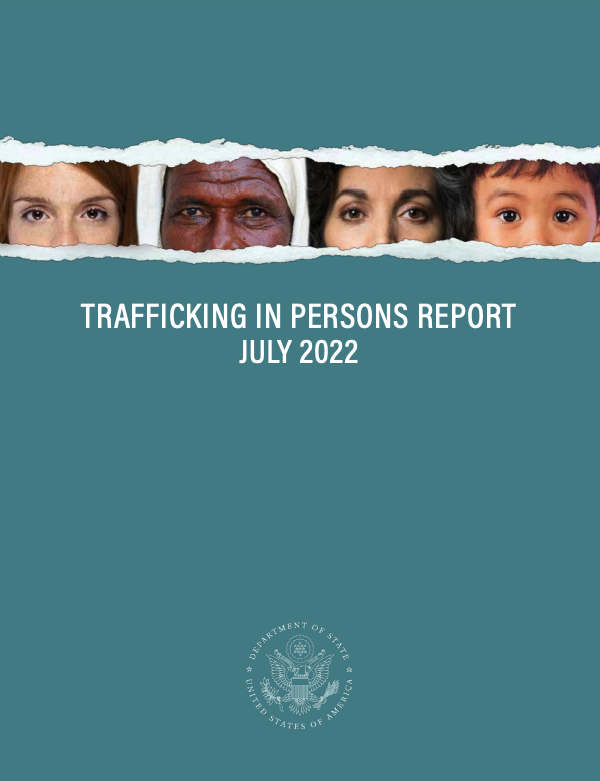The report emphasizes the importance of meaningful survivor engagement. Collaborating with survivors in all aspects of anti-trafficking efforts, including the development of practices, policies, and strategies – and prioritizing survivor leadership of those efforts whenever possible – should take precedence, says the report. In addition to highlighting 34 governments which have actively taken steps to incorporate survivor perspectives, the introduction chapter also sets out recommendations from survivor leaders on practical ways to implement trauma-informed approaches for all anti-trafficking stakeholders.
In his speech, Secretary Blinken noted a “mixed picture of progress”, with 21 countries upgraded and 18 countries downgraded in this year’s report.
While Algeria and Comoros have been moved up to the Tier 2 Watch List, those downgraded to Tier 3 include Belarus, Brunei, Cambodia, Curaçao, Macau, Sint Maarten and Vietnam. Indonesia has been moved to the Tier 2 Watch List, from Tier 2, as official complicity in trafficking crimes remains a concern which has not been addressed by the government, the report says. Malaysia remains at the lowest tier in this year’s report, while Thailand has been moved up a notch to Tier 2 from the Tier 2 Watch List because, among other things, the country has increased trafficking investigations. In Europe, Bulgaria has been downgraded to the Tier 2 Watch List amid concerns it is not taking trafficking seriously.
Topics of special interest in this year’s report include forced labour in relation to China’s Belt and Road Initiative China’s Belt and Road Initiative and in the production of inputs for clean energy technologies, and the ways in which the climate crisis exacerbates vulnerabilities. Special interest chapters also include “Promising Practices in Data Collection, Management, and Dissemination” and “Linking Efforts to Combat Corruption and Trafficking in Persons”.
For the first time, the report features a section on “State-Sponsored Trafficking in Persons”, following a 2019 congressional amendment to the Trafficking Victims Protection Act of 2000 (TVPA). Among those governments included in this section are Russia, which the department said has demonstrated a “government policy or pattern of trafficking”, including being “actively complicit” in the forced labour of North Korean workers. Alongside Russia are 10 other nations – Afghanistan, Burma, Cuba, Eritrea, Iran, North Korea, South Sudan, Syria, Turkmenistan and Yemen. Russia is also included on a separate list of nations the State Department identified as “having governmental armed forces, police, or other security forces, or government-supported armed groups that recruit or use child soldiers”. Afghanistan, Burma, Iran, Yemen and seven other countries are also included. U.S. law prohibits security assistance from being directed to those nations, as well as the commercial licensing of military equipment there.
As stated in the Secretary of State’s message, “This year’s report is released in the midst of an unprecedented humanitarian crisis. Russia’s senseless continued invasion of Ukraine and its devastating attacks across that country have inflicted unfathomable pain and suffering and forced millions of Ukrainian citizens and others to flee seeking safety. We are deeply concerned about the risks of human trafficking faced by individuals internally displaced by the war, as well as those fleeing Ukraine, an estimated 90 percent of whom are women and children.”
Kateryna Cherepakha, president of La Strada Ukraine, has been honored as one of six 2022 TIP Report Heroes, alongside Mohammed Tariqul Islam from Bangladesh, Major Mohammad al-Khlaifat from Jordan, Judge Cornelius Wennah from Liberia, Irena Dawid-Olczyk from Poland, and Apinya Tajit from Thailand. Congratulations to all!
The TIP Report is the U.S. government’s principal diplomatic and diagnostic tool to guide relations with foreign governments on human trafficking. As required by the TVPA, the TIP Report assesses government efforts around the world to prevent trafficking, protect victims and prosecute traffickers. This year’s report, the 22nd installment, includes narratives for 188 countries and territories, including the United States.

